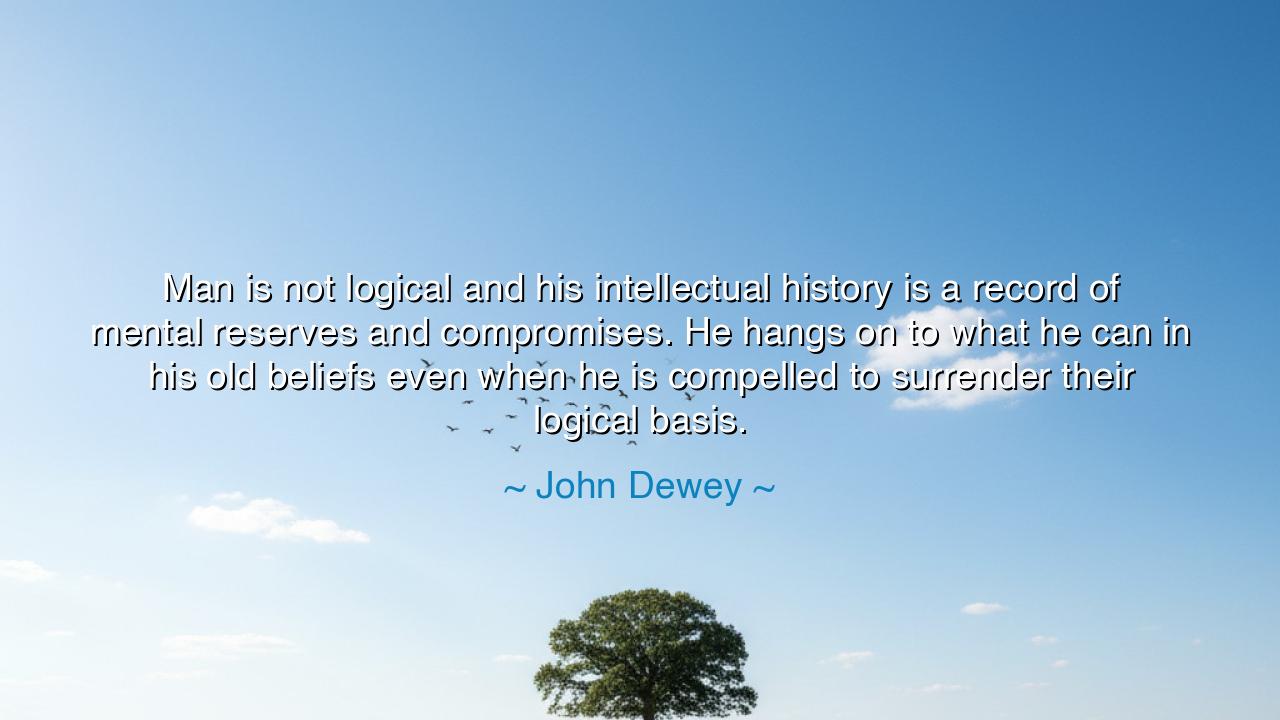
Man is not logical and his intellectual history is a record of
Man is not logical and his intellectual history is a record of mental reserves and compromises. He hangs on to what he can in his old beliefs even when he is compelled to surrender their logical basis.






The philosopher and reformer John Dewey, one of the great voices of modern pragmatism, once wrote: “Man is not logical and his intellectual history is a record of mental reserves and compromises. He hangs on to what he can in his old beliefs even when he is compelled to surrender their logical basis.” In these words, Dewey lays bare a truth that pierces through the pride of human reason — that mankind, though he worships logic, is ruled not by pure intellect but by habit, fear, hope, and the longing for certainty. His insight is not a condemnation, but a revelation: that the human spirit is torn between progress and comfort, between the courage to change and the desire to hold fast to what feels safe.
The origin of this thought comes from Dewey’s lifelong study of human learning, philosophy, and social change. Living in an age of transformation — the industrial revolution, the rise of science, the dawn of modern democracy — Dewey sought to understand why societies cling so stubbornly to old ways even when reason exposes their flaws. He saw that the march of enlightenment was not steady or smooth; it advanced by fits and starts, slowed not by ignorance alone, but by the human heart’s reluctance to abandon familiar faiths. To Dewey, the intellectual history of humanity was not a tale of pure logic, but of mental compromise — a delicate dance between discovery and denial.
To understand his meaning, we must look back across the long arc of human history. When Copernicus first declared that the Earth revolved around the sun, the logic of his reasoning was clear. Yet the world resisted. The Church clung to the geocentric heavens not merely out of stubbornness, but out of fear — fear that the universe, once shifted, would leave man adrift, no longer the center of divine attention. So too, when Charles Darwin revealed the slow unfolding of life through evolution, the truth struck at ancient certainties. And even as evidence mounted, many held on to their old beliefs, unable to surrender the comforting image of a world created all at once by divine hands. In these moments, we see Dewey’s truth: that mankind does not release his beliefs because logic tells him to, but only when his soul finds something equally strong to hold in their place.
This struggle is not confined to faith or science; it lives within every one of us. When life changes — when new truths confront us — we feel the same tension. The old beliefs are our shelter; they have guided us, comforted us, given shape to our identity. And so, when logic demands their surrender, we resist. We justify, we reinterpret, we make mental compromises, hoping to keep what is dear while adjusting only what reason compels. We tell ourselves we are rational beings, yet our hearts cling to what is familiar, even when it no longer fits the world as it is. Dewey saw this not as weakness, but as the human condition itself — a sign that reason must walk hand in hand with emotion if truth is ever to find a home in the soul.
One might recall the story of Galileo, who, forced before the Inquisition, recanted the very truth he had proven — that the Earth moves. Though history remembers him as a martyr for reason, Dewey would have seen in him the essence of his quote: even the boldest mind makes compromise when cornered by fear or survival. Yet the truth he spoke could not be erased; it lived on, waiting for a time when hearts and minds could bear it. Thus, history moves not by the triumph of reason alone, but by the slow reconciliation between truth and the human will. Progress is born not only of knowledge, but of courage — the courage to let go of the comforts that bind us.
In Dewey’s wisdom, we find both humility and hope. He reminds us that the journey of civilization is not a straight ascent into light, but a wavering path marked by hesitation and partial awakenings. Man is not logical — but he is capable of learning, adapting, and eventually embracing what once seemed unthinkable. Each generation must live through its own reckoning, torn between the world that was and the world that is coming. The true hero of history, Dewey suggests, is not the flawless thinker, but the one who dares to face his contradictions and move forward despite them.
So let this be the lesson passed down through the ages: do not despise the slowness of human change, but work to hasten its awakening. When reason and faith collide, seek not only to prove, but to persuade; not only to be right, but to understand. Recognize the power of emotion and habit, for these are the roots of belief. And when the time comes to surrender what no longer serves truth, do so with grace, knowing that wisdom is not the destruction of the past, but its transformation. Hold what is worthy, release what is false, and let reason and compassion walk together — for that is how humanity, imperfect yet enduring, continues its long and noble march through the centuries.






AAdministratorAdministrator
Welcome, honored guests. Please leave a comment, we will respond soon